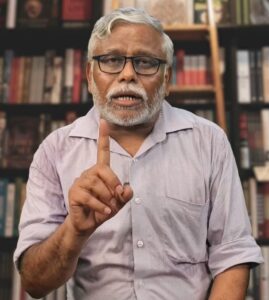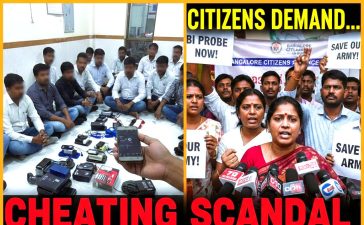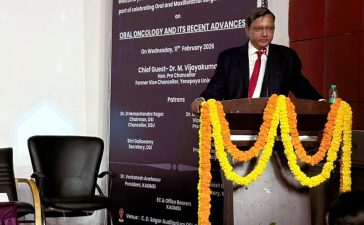Bababudangiri Dispute: Congress Accused of Joining Hands with RSS, Right-Wing Forces?
“ಬಾಬಾಬುಡನ್ ದರ್ಗಾ ಸಂಘಿಗಳ ಜೊತೆ ಕೈಗೂಡಿಸಿದ ಕಾಂಗ್ರೆಸ್…” ಪ್ರೊ. ಶಿವ ಸುಂದರ್
Congress Backtracks on Secular Promises
In the 2023 elections, Karnataka’s Dalit and marginalized communities largely backed the Congress, hoping the party would counter the Hindutva-driven policies of the previous BJP government. However, Congress has seemingly abandoned those commitments, particularly regarding the Bababudangiri Dargah issue, where it has aligned with right-wing forces, disregarding the region’s tradition of communal harmony.
BJP’s Communal Policies and Court Battles
The previous BJP government attempted to alter the status of Bababudangiri Dargah, historically a shared religious site for Hindus and Muslims. Despite evidence from religious custodians, progressive leaders, and devotees proving its status as a dargah, the BJP government ignored historical records and appointed a Hindu priest to the shrine, violating the Places of Worship Act (1991) enacted by the Congress itself.
This decision was legally challenged by the shrine’s custodian, Shakhadri, in the Karnataka High Court in 2022. However, the court upheld the BJP government’s order in 2023. Subsequently, Shakhadri took the case to the Supreme Court in June 2023.
Congress Government’s Inaction and Legal Maneuvering
When Congress assumed power in May 2023 under Chief Minister Siddaramaiah, there were expectations of policy reversals. However, the government delayed its response when the Supreme Court sought Karnataka’s opinion in January 2024. Under the guise of awaiting parliamentary elections, Congress postponed its affidavit, drawing criticism from activists.
In January 2025, when Shakhadri filed a contempt petition, the Supreme Court issued a warning: if the Karnataka government failed to respond within eight weeks, it would face penalties. Congress had a clear legal precedent from its own 2017 decision that upheld the dargah’s historical status. Instead of reaffirming it, Home Minister Parameshwara formed a new cabinet sub-committee, reopening discussions and allowing the BJP to reassert its claims over the shrine.
Despite strong opposition from the Communal Harmony Forum, which presented documentary evidence countering BJP’s claims, Congress ultimately submitted an affidavit to the Supreme Court on March 26, 2025, endorsing the appointment of a Hindu priest and creating a management committee led by the District Collector, ensuring equal representation from both communities. Shakhadri was relegated to a mere permanent member. This mirrored the BJP’s 2022 policy, effectively legitimizing their communal agenda.
The Larger Battle Over Karnataka’s Cultural Identity
The Congress’s failure to challenge Hindutva narratives reflects a broader struggle. Unlike the BJP-RSS, which systematically integrates cultural and religious identity into its politics, opposition parties, including Congress, lack a coherent ideological response. The BJP’s strategic use of communal narratives has successfully drawn public support, even among economically struggling groups, reinforcing their electoral dominance.
Bababudangiri is just one example of this trend. The region, once a stronghold of secular and leftist movements, has witnessed the systematic spread of right-wing ideology. The Congress’s reluctance to counter this shift has only strengthened the BJP’s position.

The Historical Context of Bababudangiri Dargah
Bababudangiri, a centuries-old shrine in Chikkamagaluru, has long been a shared spiritual space for Hindus and Muslims. Historical records indicate that up to 1975, the site faced no disputes. Government records from 1904-05 show that out of 9,788 pilgrims visiting the site, 8,200 were Muslims, while only 638 were Hindus, with just 83 Brahmins.
The shrine is dedicated to the Sufi saint Dada Hayath Meer Khalandar, and for generations, a Muslim Mujawar appointed by the Shakhadri has overseen religious rituals. The tradition of both communities offering prayers in the form of Chirag (oil lamps) and Chadar (cloth offerings) has been preserved at the site, similar to practices observed in other dargahs across South Asia.
However, in 1975, the Karnataka government classified the shrine as Wakf property, leading to legal disputes. The initial petitions from Hindu devotees were limited to ensuring their access to the shrine rather than seeking the appointment of a Hindu priest. It was only between 1975 and 2003 that the right-wing groups systematically spread misinformation, fabricating a new history to claim that the shrine was originally a Hindu temple forcibly converted by Tipu Sultan.
Congress’s Role in Hindutva’s Expansion
In 1992, amid the Babri Masjid demolition, the VHP pushed for the recognition of Bababudangiri as Dattapeetha. Despite court rulings confirming the shrine’s dargah status, the Congress government allowed the first-ever Dattatreya Jayanti celebration in December 1992, providing official legitimacy to the VHP’s false claims.
Subsequent Congress-led administrations continued to compromise. In 1999, the government formalized the event by appointing a district administration-led committee, further institutionalizing the VHP’s religious narrative. The region, once a secular bastion, became a breeding ground for Hindutva politics.
Judiciary and Bureaucracy’s Role in Communal Polarization
In 2003, a petition was filed in the Karnataka High Court demanding the appointment of a Hindu priest. The petitioners presented no historical evidence, relying solely on an administrative report from 1988, authored by a deputy commissioner based on an oral statement from a VHP-affiliated lawyer.
Despite this lack of evidence, the Karnataka High Court ruled in favor of appointing a Hindu priest in 2007. A subsequent challenge in the Supreme Court remained undecided. By 2015, amid rising right-wing influence, Justices Ranjan Gogoi and NV Ramana directed the Karnataka government to decide the matter.
The 2017 Congress government, following an expert committee’s recommendations, reaffirmed the shrine’s dargah status. However, with the BJP’s return to power in 2019 through Operation Kamala, the state stopped defending this decision in court. In 2021, following the controversial Ayodhya verdict, the Karnataka High Court ruled that since the majority believed the site was a Hindu shrine, a Hindu priest should be appointed.
Congress’s Continued Complicity
Despite Congress’s historical role in opposing Hindutva, its recent actions have once again legitimized right-wing claims. The party’s failure to take a principled stand has reinforced the BJP’s communal agenda, undermining Karnataka’s legacy of pluralism.
Bababudangiri’s transformation from a shared religious space into a site of sectarian conflict highlights a larger national trend. The Congress’s reluctance to challenge this shift politically, legally, and ideologically has allowed the BJP to cement its Hindutva agenda, reshaping Karnataka’s social and political landscape for generations to come.
Short Summary:
The Congress government’s recent handling of the Baba Budan Dargah dispute has sparked controversy. Accusations of political appeasement and inconsistent secularism have surfaced, with critics pointing to the party’s selective stance on religious issues. The decision—or lack thereof—has fueled tensions between communities, raising concerns about electoral motivations overriding historical and cultural sensitivities.
Context & Background:
Baba Budan Dargah in Chikkamagaluru, Karnataka, has been a point of contention for decades. A revered Sufi shrine, it is claimed by both Hindus and Muslims, leading to legal and political battles over its administration and rituals. The Congress government’s ambiguous position on the matter has invited criticism from multiple fronts, with allegations of favoring vote-bank politics instead of upholding a clear, fair policy.
Key Quotes:
-
“Congress’s doublespeak on secularism is exposed yet again. Why the hesitation in making a clear decision?” – Political Analyst
-
“We have always respected the sentiments of all communities. The matter is complex, and we are handling it sensitively.” – Congress Leader
-
“If BJP takes a stand, it’s communal; if Congress does nothing, it’s secular? Hypocrisy at its peak.” – Social Media Commentator
-
“History and faith should not be tools for electoral gains. Baba Budan Dargah deserves a just resolution.” – Historian
-
“A government that hesitates to take a decision today will pay the price at the ballot box tomorrow.” – Opposition Leader
Q & A:
Q: What is the controversy surrounding Baba Budan Dargah?
A: It is a centuries-old Sufi shrine where both Hindus and Muslims hold religious claims. The dispute revolves around its management and the nature of rituals performed there.
Q: Why is Congress being criticized?
A: The party is accused of avoiding a clear decision to appease different voter blocs, thus fueling tensions instead of resolving the issue.
Q: How has the opposition reacted?
A: BJP and right-wing groups have accused Congress of hypocrisy, claiming it applies double standards to Hindu and Muslim religious matters.
Q: What impact could this have on upcoming elections?
A: The controversy could influence Karnataka’s political landscape, with Congress facing backlash for perceived inaction while BJP attempts to capitalize on the issue.
Timeline of Events, Political Reactions, and Legal Aspects of the Baba Budan Dargah Dispute
📌 Historical Background
-
16th Century: Sufi saint Baba Budan is believed to have brought coffee to India from Yemen and settled in the Chikkamagaluru hills, where a shrine was built in his honor.
-
18th Century: The site became a place of worship for both Hindus and Muslims, with differing religious narratives emerging over time.
🗓️ Timeline of Key Events
🔹 1950s-60s:
-
The shrine, locally known as Dattatreya Peetha, saw increasing claims from Hindu groups who asserted that it was originally a Hindu temple dedicated to Lord Dattatreya.
🔹 1975:
-
Karnataka government issues a notification recognizing the shrine as a “Wakf property,” fueling controversy.
🔹 1980s-90s:
-
Right-wing Hindu organizations intensify demands to reclaim the site as a Hindu temple, while Muslim groups and Sufi followers oppose any change.
🔹 2008:
-
The Karnataka High Court directs the state government to resolve the dispute and decide on the nature of worship at the site.
🔹 2011:
-
The BJP-led Karnataka government forms a panel that recommends the site be declared a Hindu shrine, sparking further tensions.
🔹 2016:
-
The Karnataka High Court upholds the government’s power to regulate religious practices at the site but refrains from declaring its religious identity.
🔹 2021:
-
The Supreme Court of India refuses to intervene and leaves the decision to the state government.
🔹 2023:
-
The Congress party comes to power in Karnataka and puts the issue on hold, avoiding a clear stance.
🔹 2024-2025:
-
Protests erupt as Hindu and Muslim groups demand clarity. Congress is accused of delaying a decision to appease all sides ahead of elections.
⚖️ Legal & Administrative Aspects
-
Government Control: The Karnataka government has the authority to regulate religious practices at the shrine, but it has avoided taking a firm decision.
-
High Court’s Role: The Karnataka High Court has upheld the government’s power to make a decision but has not ruled on the religious identity of the shrine.
-
Supreme Court Stance: The Supreme Court has declined to intervene, leaving the matter to state authorities.
-
Wakf Board vs. Hindu Groups: The Wakf Board maintains that it is a Muslim shrine, while Hindu organizations continue to demand its recognition as a Hindu temple.
🗳️ Political Reactions
Ruling Congress Government (2023-Present)
✅ Avoiding direct action to prevent backlash from either community.
✅ Accused of delaying a decision for political convenience.
✅ Emphasizing secularism and social harmony in public statements.
Opposition BJP
❌ Criticizes Congress for its indecisiveness and “vote bank politics.”
❌ Calls for recognition of the site as a Hindu temple.
❌ Accuses Congress of appeasing minorities at the cost of Hindu sentiments.
Opposition JD(S)
🔸 Takes a neutral stance but demands a resolution to prevent communal tensions.
🔸 Calls for a “people’s decision” based on historical and legal evidence.
![]()












Need more such updates